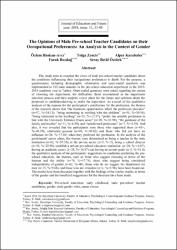The Opinions of Male Pre-school Teacher Candidates on the their Occupational Preferences: An Analysis in the Context of Gender
Özet
Bu çalışmanın amacı, erkek okul öncesi öğretmen adaylarının mesleki tercihlerini etkileyen koşullara ilişkin görüşlerini derinlemesine incelemektir. Bu amaçla, 2015-2016 öğretim yılında Türkiye'de Okul Öncesi Öğretmenliği lisans programlarında öğrenim gören 112 erkek öğrenciye demografik bilgileri ve açık uçlu soruları içeren bir anket uygulanmıştır. Açık uçlu sorularla öğretmen adaylarının; bu bölümü tercih etme nedenleri, bölüm tercih sürecinde karşılaştıkları güçlükler ve aldıkları destekler, gelecek kariyer planları ve bölümü tercih etmek isteyen adaylara önerilerine ilişkin görüşleri alınmıştır. Katılımcıların bu mesleği tercih etme nedenlerine ilişkin nitel analiz sonucunda, mesleğin sunduğu iş imkânları (n=57, %=34.13), çocuklarla çalışmaya ilgi duyma (n=51, %=30.54), öğretmenlik mesleğine ilgi duyma (n=21, %=12.57), YGS sonucuna uygun bir bölümü tercih etme (n=20, %=11.98), aile ve öğretmen yönlendirmesi (n=11, %=6.59 ve bilinçsiz tercih (n=7, %=4.19) temaları bulunmuştur. Katılımcılar bölüm tercihinde bulunurken, çevrelerinde kendilerini destekleyenlerin (n=61, %=41.50), engel olmak isteyenlerin (n=60, %=40.82) ve hiç bir müdahalede bulunmayanların (n=26, %=17.68) olduğu ortaya çıkmıştır. Katılımcıların kariyer planlarına ilişkin nitel analiz sonucunda, devlette öğretmen olma (n=62, %=37.35), özel sektörde öğretmen olma (n=5, %=3), yönetici olma (n=38, %=22.90), özel bir okul öncesi kurumu açma (n=28, %=16.87), akademik kariyer planlama (n=28, %=16.87) ve hedefi net olmayanlar (n=5, %=3) şeklinde temalar ortaya çıkmıştır. Katılımcıların bölümü tercih etmek isteyen adaylara önerilerine bakıldığında, ilgi ve yetenek doğrultusunda seçim yapılmasını önerenler (n=74, %=47.74), toplumsal cinsiyetten bağımsız düşünülmesini önerenler (n=62, %=40), erkeklerin bu bölümde öğrenim görmelerini önermeyenler (n=15, %=9.68) ve kararsız olanlar (n=4, %=2.58) olduğu görülmüştür. Elde edilen bulgular, benzer araştırmaların bulguları ile beraber toplumsal cinsiyet bağlamında tartışılmış ve bazı önerilerde bulunulmuştur This study aims to examine the views of male pre-school teacher candidates about the conditions influencing their occupational preferences in depth. For the purpose, a questionnaire including demographic information and open-ended questions was implemented to 112 male students in the pre-school education department in the 20152016 academic year in Turkey. Open-ended questions were asked regarding the causes of choosing the department, the difficulties those encountered in the department selection process and their support, career plans for the future and opinions about the proposals to candidatesdesiring to prefer the deparment. As a result of the qualitative analysis of the reasons for the participants’s pereference for the profession, the themes of the research shows that “the bussiness oppurtunities which the profession provides” (n=57, %=34.13), “being interesting in working with the children” (n=51, %=30.54), “being interested in the teaching” (n=21, %=12.57), “prefer the suitable profession in line with the University Entrance Exam score” (n=20, %=11.98), “the guidance of the family and teacher” (n=11, %=6.59), and “uninformed preference” (n=7, %=4.19). And also, it was revealed that the participants were those who supported them (n=61=, %=41.50), obstructed persons (n=60, %=40.82) and those who did not have an influence (n=26, %=17.68) when they preferred the profession. In the analysis of the participants' career plans, the themes were determined as being a teacher in the state institution (n=62, %=37.35), in the private sector (n=5, %=3), being a school director (n=38, %=22.90), establish a private pre-school education institution (n=28, %=16.87), having an academic career (n=28, %=16.87) and having no certain goals (n=5, %=3). In the qualitative analysis of the participants’ suggestions to candidates preferring the preschool education, the themes, such as those who suggest choosing in terms of the interest and the ability (n=74, %=47.74), those who suggest being considered independently of gender (n=62, %=40), those who do not suggest the department for men (n=15, %=9.68), and those who are irresolute (n=4, %=2.58), have been found out. The results have been discussed together with the findings of the similar studies in terms of the gender and the beneficial suggestions for the literature have been made
Kaynak
Journal of Education and FutureCilt
0Sayı
13Bağlantı
https://app.trdizin.gov.tr//makale/TWpjMk16TTBOQT09https://hdl.handle.net/20.500.12809/7790


















